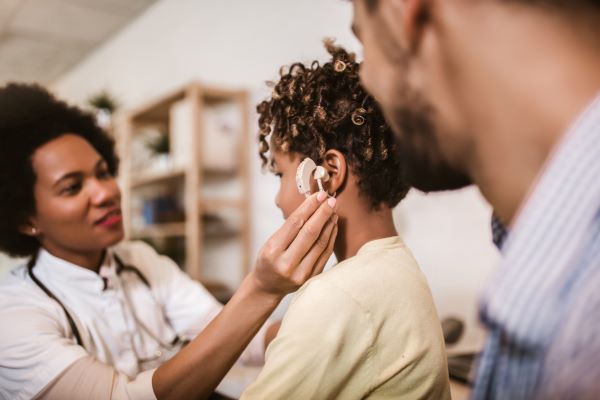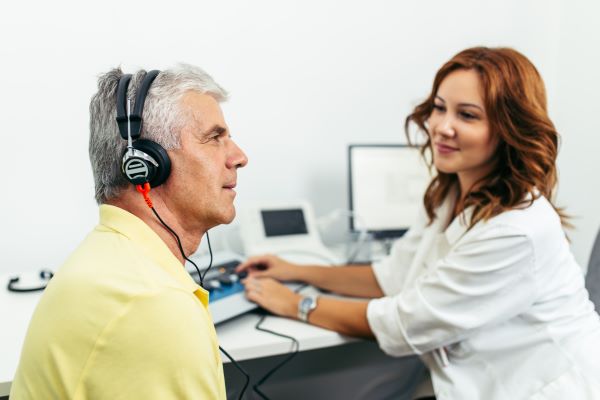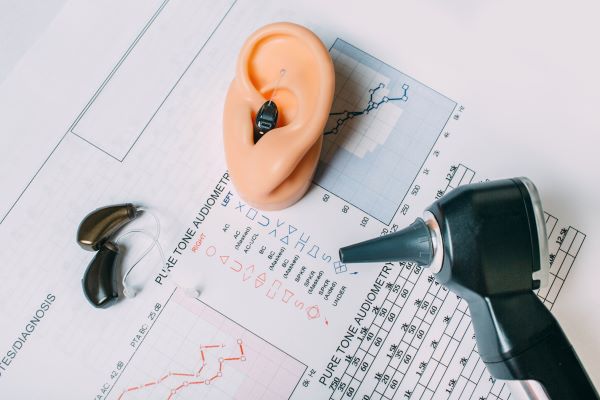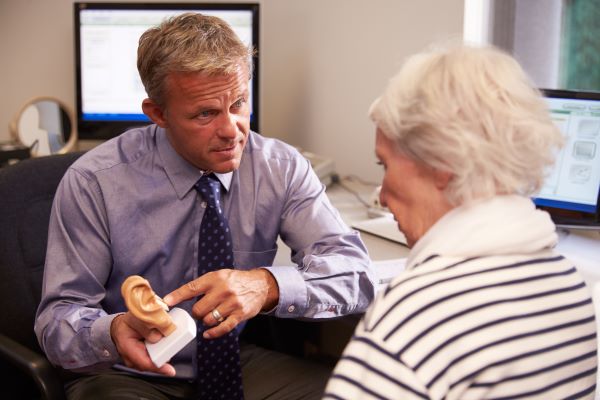Kind words, uplifting music, a child’s laughter – some of the best things in life are sounds we hear with our ears. For a person living with hearing problems, however, hearing these sweet sounds isn’t something that happens naturally. To be able to hear to the best of their potential, they need the help of a health care provider called an audiologist. It takes hard work and plenty of study and clinical experience to become an audiologist, but for the right person, the difference you can make in this career is worth it all.

What Do Audiologists Do?
According to the Bureau of Labor Statistics (BLS), audiologists provide a multitude of services to patients with hearing loss and balance disorders, including diagnosing, managing, and treating these health issues. Additionally, audiologists can help patients and families affected by hearing loss to develop communication strategies, like learning to read lips or use technological tools for communication.
Audiologists work in a variety of settings. Most audiologists work in a clinical setting of some sort, including audiology clinics. More than one in four audiologists work in physicians’ offices, according to the BLS. ENT offices, the offices of physicians who specialize in ear, nose and throat health, are particularly relevant work environment options for practicing audiologists.
Many audiologists –nearly one in four – work in offices dedicated to practitioners such as physical therapists, occupational therapists, speech therapists and audiologists specifically. Hospital is another common work environment for a career in audiology. Another 15% of the workforce is employed in hospitals, administering hearing tests and providing hearing and balance care in these settings.
RELATED: What Degree Do You Need to Be a Speech Therapist?
The educational services industry is also a major employment industry for audiologists. Audiologists who work in the educational services industry may work for school districts, assisting students with hearing and balance issues, or they may work in universities where they conduct independent research and pursue academic scholarship.
Other environments where audiologists work include government agencies, such as the military, and private companies. Audiology roles in private industry and the military usually revolve around developing safety protocols, programs and procedures for hearing conservation, noise reduction and hearing protection in noisy working conditions. Becoming an audiologist opens up to you a broader array of opportunities and work environments than most people would initially think.
Testing and Treating Hearing Loss
The only way to determine if hearing loss or hearing problems are present – and the extent of the problem – is to test hearing. Audiologists are in charge of administrating hearing tests and conducting other exams to find the cause of their patient’s problem and create a treatment plan.

Over the course of a patient’s treatment, an audiologist must evaluate and keep track of the patient’s condition so they can make any necessary changes to the treatment plan.
Dispensing Hearing Aids
One of the ways hearing loss can be treated is through the use of wearable electronic devices known as hearing aids. A hearing aid typically consists of a microphone component, an amplifier component and a speaker component, according to Johns Hopkins Medicine. Fitting a patient for hearing aids and dispensing hearing aids is part of the work of an audiologist.
Audiologists also fit and dispense to patients other types of assistive listening devices, according to the BLS. Assistive devices of this nature are used with hearing aids to amplify, or make louder, the sounds hearing aids pick up. According to the National Institute on Deafness and Other Communication Disorders, some examples of assistive listening devices that may help patients who have hearing aids to hear better include:
- Hearing loop systems, also called induction loop systems, which transmit sounds using electromagnetic energy
- Infrared systems, which transmit sounds using infrared light
- FM systems, which transmit sounds through radio signals
- Personal amplifier devices that can amplify sound levels while diminishing background noise
It’s important to note that audiologists are not the same as hearing aid dispensers. Audiologists are healthcare professionals who go through a doctoral program of education and a licensing process. Hearing aid dispensers, on the other hand, don’t have to have any medical or healthcare education. Their primary purpose is to sell hearing aids, and they are not authorized to diagnose any other hearing or health problems or to offer any other health treatment options. Similarly, a hearing instrument specialist has a background in hearing technology and assistive devices, but they don’t have the doctoral-level knowledge of the anatomy of the hearing system that an audiologist possesses.
Recommending Cochlear Implants
One method audiologists may recommend for treating hearing trouble is cochlear implants. Cochlear implants are devices that have two parts that work together to help those with hearing loss perceive sound, although these implants don’t restore “normal” hearing.
One part of the implant is surgically implanted into the patient’s inner ear, while another part is worn near the patient’s head. These two parts work together to facilitate hearing, with the outside part picking up sound via a microphone and sending a digital signal to the receiver located in the inner ear. Then the receiver sends signals directly to your brain via electrodes so it can recognize the sounds being detected.
Cochlear implants are available to both children and adults who have had severe hearing loss. Generally, children must be at least nine months old and have not shown any benefit from hearing aids to be considered candidates for cochlear implants, while adults with profound hearing loss might consider these implants if they have difficulty hearing conversations even when using hearing aids.
Not all audiologists are qualified to assess patients’ candidacy for cochlear implants. If you want to become an audiologist who is qualified to perform this task, you will need to pursue Cochlear Implant Specialty Certification (CISC) from the American Board of Audiology (ABA). Even with this certification, audiologists aren’t authorized to perform the procedure needed to insert the implants themselves. This is a surgical procedure and must be done by a trained surgeon, like an ear, nose and throat doctor (ENT), also called an otolaryngologist.
When audiologists work at a cochlear implant center, they will typically collaborate with an array of other health professionals working in clinical practice with the patients there, including ear, nose and throat doctors or surgeons, psychologists and speech-language pathologists.
RELATED: What is the Right Path to Becoming a Speech Therapist?
Treating Balance Disorders
Audiologists’ knowledge of the human ear makes them well suited for treating balance disorders. The hearing system and the vestibular system – the sensory system that is responsible for humans’ sense of balance and spatial orientation – both use the vestibulocochlear nerve to send sensory signals to the brain.

When patients suffer from dizziness, falling, motion sickness, vertigo, or other balance problems, an audiologist can conduct vestibular assessment – in other words, balance testing –and provide treatment to fix or improve these symptoms. These treatment plans can include surgery, medication, or even vestibular rehabilitation, a treatment program in which exercises are used to help improve stability and symptoms of vertigo.
Is an Audiologist a Doctor?
People who want to become an audiologist often wonder whether an audiologist is considered a doctor. If you’re defining the term “doctor” as a person who has a doctoral degree, then yes, audiologists training for the career today – and over the past 20+ years – are doctors. Since 2001, the Academy of Doctors of Audiology (ADA) has required new audiologists to have a Doctor of Audiology degree.
However, audiologists are not “physicians” or “medical doctors,” like ENTs are, and they don’t go to what would be accurately classified as “medical school,” even though some audiology programs are offered out of schools of medicine. For example, the Washington University School of Medicine in St. Louis offers a Doctor of Audiology (AuD) program. Instead, you would undertake a specialized AuD doctoral degree program to become an audiologist.
You can think of audiologists as the hearing-focused equivalent of optometrists. Both of these healthcare practitioners complete lengthy doctoral programs in specialized health matters that include supervised clinical experience.
RELATED: What Degree Do I Need to Be an Optometrist?
Becoming an Audiologist
Although you need a doctoral degree to begin practicing in the field of audiology, you should start thinking about your path to this profession early on. The first step you should take to become an audiologist is earning a bachelor’s degree.
Bachelor’s Degrees for Audiologists
Although there may not be a bachelor’s degree in audiology program specifically, there are undergraduate options like a degree in communication sciences and disorders, hearing science and related areas. Most audiology students have a bachelor’s degree in communication sciences and disorders or hearing science, according to the employment website Indeed.
However, this doesn’t mean that AuD programs will only admit students from these majors. Students who want to become an audiologist may apply from other majors as long as they have completed sufficient coursework in areas like statistics, biology and psychology while pursuing their bachelor’s degree.
RELATED: Can I Get a Graduate Degree in Speech Therapy if My Undergraduate Degree is Totally Unrelated?
Another alternative undergraduate program of study to consider is sound engineering, the field concerned with the technical aspects of sound production and recording. While a bachelor’s degree in this area has more to do with music than medical conditions like hearing loss, majoring in sound engineering provides students with a strong understanding of acoustics and sound. This knowledge is valuable if you want to become an audiologist.
Getting Into Audiology School
Earning a master’s degree beforehand isn’t necessary for most audiology doctoral program options. However, going to graduate school to earn a master’s in audiology degree could help with your knowledge in the medical field, especially if you’re coming from an unconventional undergraduate background.
Unlike medical school and optometry school, there isn’t a separate entrance test for getting into AuD programs. Instead, most degree programs in audiology ask students to submit Graduate Record Examinations (GRE) General Test scores along with their application. The GRE General Test assesses test-takers’ abilities in quantitative reasoning, verbal reasoning and analytical writing. Because there are many GRE-required AuD programs, spending time studying and preparing for this exam is important if you’re serious about pursuing a career as an audiologist.
Audiologist Licensure and Certification
Completing your education is only part of the process required to become an audiologist. To be qualified to diagnose and treat speech and hearing problems through a career in audiology, new audiologists must meet certain requirements. Every state requires that audiologists undergo a licensing process, although individual states establish their own licensing requirements.
A Doctor of Audiology degree from an American Speech-Language-Hearing Association ASHA-accredited program is the first step required to attain licensure. Aspiring audiologists must also complete any minimum supervised professional experience requirements. Audiologists must earn a passing score on a credentialing exam like the Praxis Examination in Audiology before they can be fully qualified for a career as an audiologist.
In addition to mandatory state licensure, audiologists can seek voluntary certifications. The American Board of Audiology offers three professional certification options:
- The American Board of Audiology Certified (ABAC) credential for general audiology practice
- The Cochlear Implant Specialty Certification (CISC) for audiologists interested in assessing patients’ candidacy for implants
- The Pediatric Audiology Specialty Certification (PASC) specifically for pediatric audiologists, or audiologists who work with children
The American Speech-Language-Hearing Association offers a credential called the Certificate of Clinical Competence in Audiology. Attaining the Certificate of Clinical Competence requires audiologists to meet several professional standards, including academic qualifications, verification of knowledge and skills and passing an examination.
The American Academy of Audiology (AAA) offers continuing education resources to help entry-level and established audiologists keep abreast of the latest developments in the field.
What to Expect in an AuD Program
As long as applicants to an audiology doctoral degree program have an undergraduate education that doesn’t leave any gaps in prerequisites, such as coursework in child language acquisition, they can jump right into their audiology coursework once they begin their doctoral degree.
Students in a doctoral audiology program take classes in the anatomy and physiology of hearing mechanisms, amplification, acoustics and psychoacoustics, neuroscience, vestibular sciences and the pathology of the auditory system. Coursework in calibration and instrumentation, the measurement of hearing, implants and clinical case conferences are also common.

Audiology students learn the practices of effective family-centered counseling and interviewing, research methods for the communication sciences and disorders and professional issues and ethics in the field of audiology. Courses specific to working with children, such as classes in pediatric audiology and aural rehabilitation for children, may also be part of the curriculum. Some AuD programs allow students to pursue a specialty track, such as vestibular sciences or early identification and management of children with hearing loss.
Towards the end of an AuD program, the focus of the program turns to developing the student’s clinical skills. Through a clinical externship, audiology students in their final year gain experience working in a variety of healthcare settings, including community clinics, hospitals, audiology and other types of medical practices. Your externship may also allow you to gain clinical competence in educational agencies and schools for the hearing impaired during your final year of the program.
Most AuD degree programs take four years to complete, but not all programs are four-year programs. Some schools offer an accelerated AuD degree program that can be completed in just three years.
Comparing Audiology and Speech-Language Pathology
Both audiology degree programs and SLP programs are accredited by ASHA, but there are significant differences between these fields.
The Differences Between Audiologists and Speech-Language Pathologists
While most audiologists focus on diagnosing and treating conditions like hearing loss, earwax impaction, tinnitus and vertigo, the speech-language pathologist career emphasizes disorders of the mouth, throat, and tongue and how these issues impact communication.
Speech-language pathologists often do work with people with hearing issues, but it isn’t hearing loss (and its causes) specifically that functions as their area of expertise. Speech-language pathology also emphasizes the management of symptoms that might come from a brain injury, stroke or Parkison’s disease, as well as swallowing disorders and communication disorders such as stuttering.
The biggest difference between an audiologist and a speech-language pathologist is in their approach to communication treatment. Audiology focuses on the ear and on patients’ issues with hearing and balance rather than on how they communicate.
Another difference is the level of education required to work in these roles. While audiologists need to complete Doctor of Audiology (AuD) degree programs, speech pathologists are only required to attain a master’s degree to qualify for SLP licensure.
RELATED: What Master’s Degree Should a Speech Therapist Have?
Similarities Between Audiologists and Speech Pathologists
While their areas of expertise may differ, both occupations require good interpersonal abilities to connect with patients to help them overcome communication disorders difficulties. In fact, audiologists and speech pathologists may work with the same patients, fulfilling different roles with an individual patient’s treatment team.
Both roles require an advanced education, and the Bureau of Labor Statistics reports similar salaries for the occupations: a median salary of $78,950 for audiologists as of 2020 and $79,060 for speech-language pathologists.
ASHA Certification
Both ASHA certifications show that the candidate had met rigorous academic and professional standards.
Board certification in audiology requires you to have earned a doctoral degree from an institution accredited by the Council on Academic Accreditation in Audiology and Speech-Language Pathology (CAA) as well as have completed your supervised clinical practicum hours. You must also submit your passing Praxis examination scores, your official doctoral transcript and any disclosure documents.
ASHA certification offers benefits like preparing you to meet licensure requirements, improving your opportunities for career advancement (especially in school districts) and offering the potential to earn a higher average salary. If you are planning to move to a different state, you might be able to use your certification to avoid having to provide test scores, academic degrees, or proof of clinical experience to acquire your new state licensure.
Is an Audiologist Degree Right for You?
If you’re interested in the field of healthcare and in degree options that are accompanied by high average salary rates, audiology may be the career path for you. To become an audiologist, you need excellent communication skills, critical-thinking skills and problem-solving skills. You also need a great deal of patience and compassion to be able to understand and communicate with patients who have trouble hearing and communicating, as well as to empathize with the struggles they face in their lives as a result of their hearing loss.
Of course, since becoming an audiologist necessitates going for your doctorate, you need to be willing to invest a great deal of time, effort and money into your education, as well. All in all, an aspiring audiologist should expect to spend around eight years in school after earning their high school diploma if studying full-time – four years to complete their bachelor’s degree and another four years to complete their doctoral degree in audiology. For part-time students, the path to become an audiologist will take even longer.

